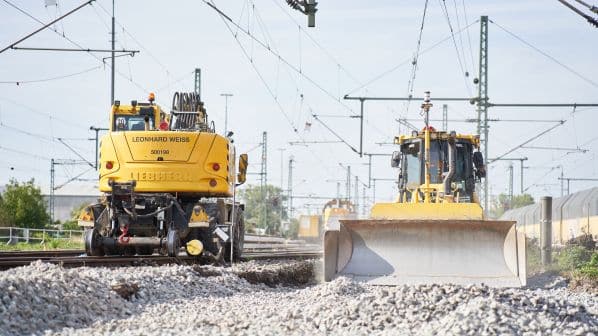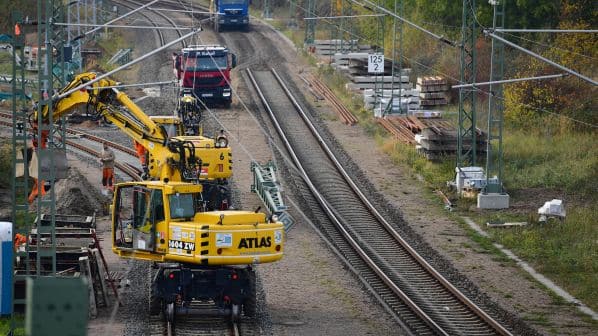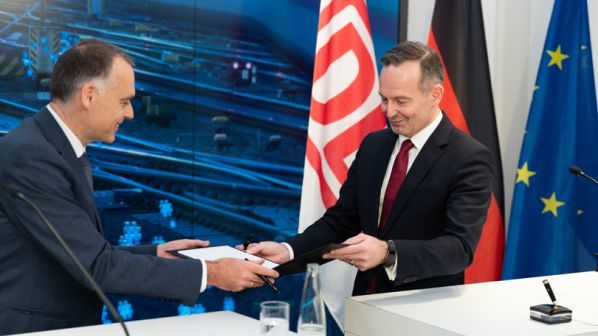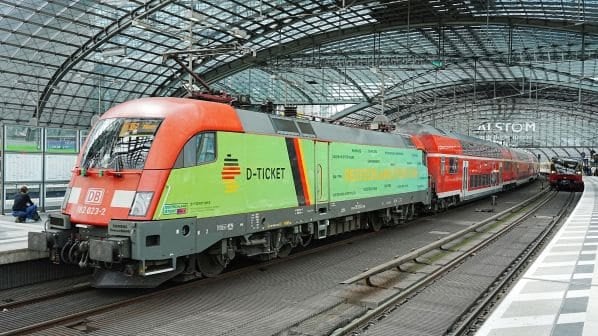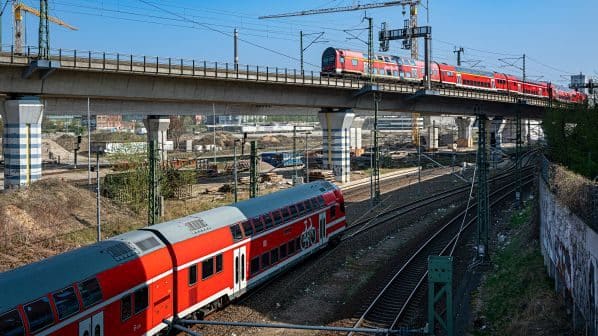GERMANY’s Federal Ministry for Digital and Transport (BMDV) and German Rail (DB) have confirmed the details of future route upgrades and infrastructure investments aimed at improving the reliability, capacity and efficiency of national rail network.
Described as the largest and most comprehensive railway infrastructure programme since rail reform in 1994, DB and the government say that their objective is to make rail traffic more punctual in the long-term and to create the conditions to achieve national transport policy goals, including modal shift.
The programme is targeting upgrades on 40 route sections by 2030 and will focus on delivering the following objectives:
- the renovation of DB’s busiest network corridors and the associated expansion into a 9000km high-performance network
- clearing the investment backlog and upgrading the rail network across the country
- capacity-boosting measures such as additional crossing points, switches and denser signalling for more stability and a better train service
- the digitalisation of the rail network with the network-wide rollout of ETCS, which DB says will creates up to 30% more capacity on the existing network
- the targeted expansion and new construction of routes to eliminate bottlenecks and deliver of the Deutschland Takt regular interval timetable, and
- a large-scale modernisation of existing railway stations throughout Germany, including offering improved comfort and greater amenities for passengers throughout the high-performance network.
Work will commence in 2024 on the Ried railway between Frankfurt/Main and Mannheim and will include upgrades to 20 stations on this route. The Hamburg - Berlin and Emmerich - Oberhausen lines will follow in 2025.
“It is now up to us to roll up our sleeves together with the construction industry,” says DB CEO, Dr Richard Lutz. “However, the truth is that the enormous construction workload will also be challenging for travellers and freight transport companies. But there is no alternative to tackling the renovation backlog. If all partners in the construction and rail industries pull together with us, this feat of strength will succeed.”
Financing plan
This work will be overseen by InfraGo, the merged business of DB Network and DB Station&Service, which is due to come into force on January 1 2024, and will continue to be fully-owned by DB.
BMDV confirmed its plans to finance the work in August. It is earmarking an additional €11.5bn for rail from an expanded truck toll in its draft budget for 2024 and financial planning up to 2027. The Climate and Transformation Fund will provide an additional €12.5bn and DB will provide an additional €3bn financed by a loan which it will raise on the capital markets. A further €12.5bn will be provided through a further equity increase. This is a total of €39.5bn. DB says that up to €45bn will be made available.
DB says the upgrade programme will require the closure of the affected routes “for several months each.” It will develop the high-performance transport concept together with the affected railway companies throughout the duration of the programme. This will include upgrading necessary diversion routes with the goal of minimising restrictions for passengers and freight companies.
It says that once the work has been completed, lines will be less prone to failure and efficiency will improve significantly.
Germany’s federal minister for transport, Dr Volker Wissing, says he expects the railway industry to keep its promises and implement the renovation as quickly as possible.
“The rail infrastructure has been neglected for decades and pushed to its absolute limits,” Wissing says. “This is no longer acceptable and unworthy of a progressive economic nation. We need rail as a climate-friendly mode of transport. However, it can only fulfil this task if it is again reliable, efficient and modern. We are now creating the organisational and regulatory framework for this.
“I call on the construction and rail industries to take advantage of this opportunity, make capacity available, turn rail into an economic stimulus programme - for passengers, for logisticians, for the construction and rail industry and thus for Germany as a business location. We give you planning security.”
Rollout plan
Subject to pending parliamentary resolutions on financing and more detailed findings from detailed planning activities, BMDV and DB have set the following schedule for high-performance network upgrades by route up to 2030.
2025:
- Hamburg - Berlin
- Emmerich - Oberhausen
2026:
- Hamburg - Hannover (subject to further decisions)
- Hagen - Wuppertal - Cologne
- Troisdorf - Koblenz
- Koblenz - Wiesbaden
- Nuremberg - Regensburg, and
- Obertraubling - Passau.
2027:
- Lübeck - Hamburg
- Bremerhaven - Bremen
- Lehrte - Berlin
- Hamm - Düsseldorf - Cologne
- Frankfurt/Main - Heidelberg
- Munich - Rosenheim, and
- Rosenheim - Salzburg.
2028:
- Bremen - Hamburg
- Nordstemmen - Göttingen
- Uelzen - Stendal
- Stendal - Magdeburg
- Hagen - Unna–Hamm
- Cologne - Bonn - Koblenz
- Koblenz - Mainz
- Bebra - Fulda, and
- Würzburg - Nuremberg.
2029:
- Hamburg - Hannover (subject to further decisions)
- Bremen/Rotenburg - Wunstorf
- Lehrte - Gross-Gleidingen
- Bebra - Erfurt
- Aachen - Cologne
- Forbach - Ludwigshafen, and
- Stuttgart - Ulm (old line).
2030:
- Bremen - Osnabrück
- Osnabrück - Münster
- Münster - Recklinghausen
- Minden - Wunstorf
- Weddel - Magdeburg
- Kassel - Friedberg
- Würzburg - Ansbach - Treuchtlingen
- Mannheim - Karlsruhe, and
- Ulm - Augsburg.
